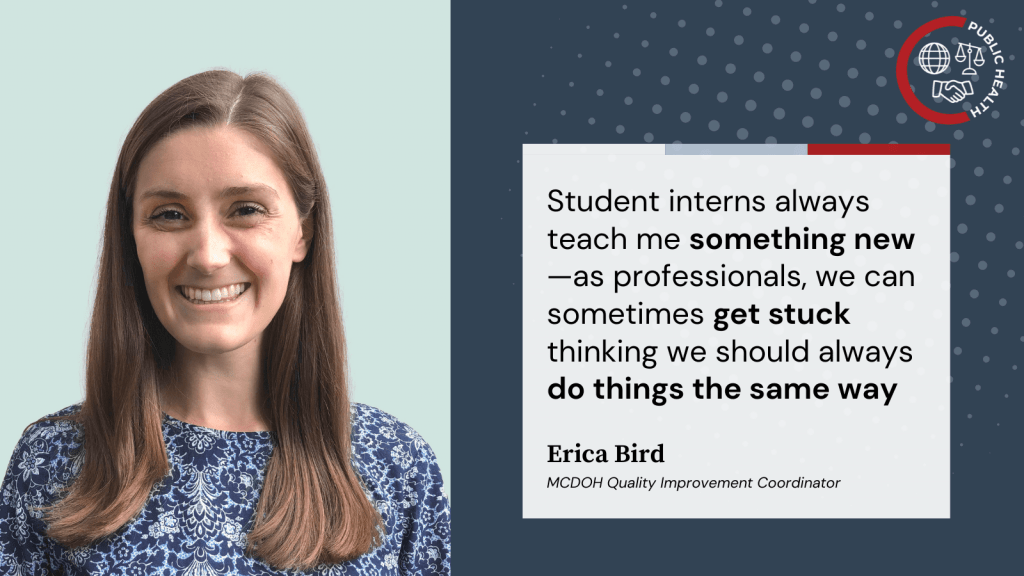Rural Health Assessment
 As a small, rural health department, Madison County Department of Health (MCDOH) relies on interns for extra support. Internships are “a win-win,” says MCDOH quality improvement coordinator Erica Bird. “We have a staff of about 30, so we really appreciate the extra hands, and students get to take what they learn in the classroom and translate it to real life.” Bird reached out to the Cornell MPH Program to recruit support for the 2022 Madison County Community Health Assessment (CHA), conducted in partnership with hospitals and other organizations. She knew this could be “an incredible opportunity” for an MPH student, since she developed a CHA for a hospital as a student years ago. “That experience really shaped my career path,” says Bird. MPH student Margaret Joy Maison joined their team to assist with the CHA in Spring 2022.
As a small, rural health department, Madison County Department of Health (MCDOH) relies on interns for extra support. Internships are “a win-win,” says MCDOH quality improvement coordinator Erica Bird. “We have a staff of about 30, so we really appreciate the extra hands, and students get to take what they learn in the classroom and translate it to real life.” Bird reached out to the Cornell MPH Program to recruit support for the 2022 Madison County Community Health Assessment (CHA), conducted in partnership with hospitals and other organizations. She knew this could be “an incredible opportunity” for an MPH student, since she developed a CHA for a hospital as a student years ago. “That experience really shaped my career path,” says Bird. MPH student Margaret Joy Maison joined their team to assist with the CHA in Spring 2022.
A CHA, which involves collecting and analyzing data to understand health factors and available resources in a community, is mandated by the New York State Department of Health to be conducted every three years, in every county. In 2022, Madison County identified chronic disease and mental health/substance use disorder prevention as priority areas. “That’s what drew me to the project,” says Maison, who had created a non-governmental organization (NGO) to support mental health among Ghanaian youth, before joining Cornell’s MPH program. “Depression is a major problem in Ghana,” says Maison, who established the Ghana Youth Movement for Mental Health after bringing together a network of friends, psychologists, churches, companies, and other NGOs to kickstart the organization.
In Madison County, Maison sorted through data and wrote sections of the CHA with Bird’s mentorship. “Current data available indicate that Madison County has significantly improved in some areas of mental health and substance use,” says Bird. However, the county also saw an increase in hospitalizations due to self-harm this past year. “Suicidal ideation and depression have actually increased,” Maison points out. At the national level, while suicide rates in 2019 and 2020 decreased “for the first time in 20 years,” depression has worsened across the country. MCDOH expects data to reflect the impact of the pandemic in coming years, and will continue working on this as a priority area.
“Everything I was learning in MPH classes was immediately relevant to this project,” reflects Maison, who was able to apply new data visualization and logic modeling skills when writing the report. Before this experience, Maison had never before worked for a direct supervisor, having completed an undergraduate degree from Cornell in biology and society just a few months before enrolling in the MPH program. “Data tell a story,” says Bird. “I was helping MJ learn how to tell that story.”
After completing a CHA, the next step for each county is a community health improvement plan (CHIP). Bird is bringing together a group of community stakeholders that includes agencies, non-profits, and community members to serve on CHIP working groups. The ultimate goal, says Bird, is “to build collective action” to address the priority areas.
Written by Audrey Baker
